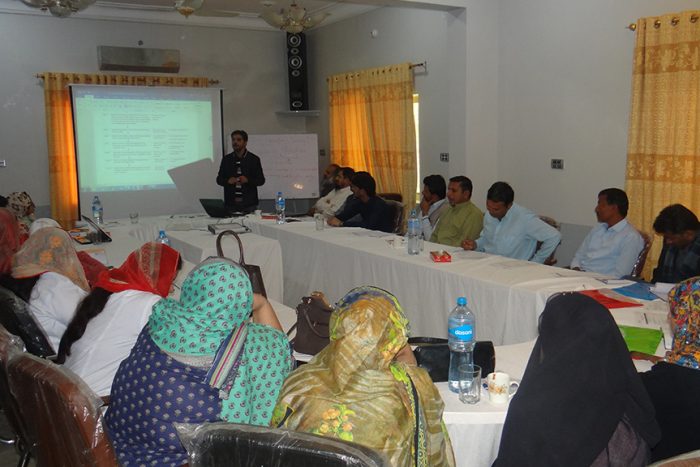Improving systems’ efficiency and accountability through staff training and development
Two in-house orientation sessions for forty-four staff members on Training Evaluation Methodology, Complaint Response Mechanisms and Theory of change (ToC) were conducted by our MEAL unit in Umerkot this February. The day-long orientations[1] aimed at developing ToC documents for new projects together with participating staff members, strengthen their capacity on CRM and introduce them to new and simple evaluations process, tools and methodologies.
Revising Evaluation Methodologies
Program teams of CWSA have been evaluating trainings conducted under the various thematic areas that the organization works in through a variety of approaches and tools in the past. During these evaluations, certain gaps were identified in the existing methodologies applied which lead to incomplete information and to an extent challenges in measuring project impact. To address this gap, CWSA’s MEAL unit revised the organization’s evaluation and monitoring system and planned thorough orientations of it to different program teams so that a common methodology is consistently applied through all projects and division of responsibilities, through the process, is clarified among all relevant staff members.
During the orientation, the guidelines of the methodology and its process flowchart was discussed with all participants in detail and the development of the Learning Outcome form to measure training objectives was explained. Participants were briefed on the standardization of a training evaluation methodology and the learning outcome form within the organization.
This new form (Learning outcome) has been designed to identify between four to six learning outcomes from the objectives of each training. The form will be completed by every training participants at the pre and post stage, resulting in a systematic comparison of the participants learning before and after a training conducted by CWSA. The previous forms used by the training teams included lengthy questions that were not reflecting the training objectives or provide a clear learning impact.
 “It is good that some responsibilities are shared among different departments for this new training evaluation methodology and we will definitely get support from MEAL Unit”. Shahab Anjum, Program Coordinator, exclaimed.
“It is good that some responsibilities are shared among different departments for this new training evaluation methodology and we will definitely get support from MEAL Unit”. Shahab Anjum, Program Coordinator, exclaimed.
Reinforcing Complaint Response Mechanisms
There was a need for a detailed orientation on CRM as new staff are recruited under CWSA’s latest Drought Response and Emergency Food Relief projects[2] in the Sindh province. This was also a good opportunity for existing staff to receive a refresher course on CRM as it is vital for our accountability processes to the communities we serve.
In the session on CRM, staff was oriented on the different procedures and channel processes of lodging and addressing complaints. These included complaints made internally, by CWSA employees and consultants, and externally, by community members, vendors and partnering organizations. Participants were thoroughly oriented on the complaint form with each being provided a hard copy for review and input.
Staff members raised questions on the timelines set for responding to complaints, processes of logging and redress and conditions of appeal, which were all addressed and carefully explained by the MEAL team.
Older staff members shared their experiences of receiving and responding to complaints on different occasions of projects’ deliverance processes which was important learning for newer employees.
 “Initially the complaint boxes were rarely used by project participants. As their learning grew, they started to share their hurdles with us. This has built trust in the communities we work in as we aim to address the issues timely,” shared Lata Kumari Khatri, Enterprise Development Officer.
“Initially the complaint boxes were rarely used by project participants. As their learning grew, they started to share their hurdles with us. This has built trust in the communities we work in as we aim to address the issues timely,” shared Lata Kumari Khatri, Enterprise Development Officer.
Introducing Theory of Change (ToC)
The session on Theory of Change took the last slot in the day-long orientation session but was the most labour intensive and engaging for the participants. Taking the format of a mini workshop, the session focused on the concept and purpose of ToC and its significance in the successful evaluation of projects.
The task of planning and carrying out evaluation research that provides information on the fieldwork practices and lessons learnt in general is a challenge. Within the wider TOC framework, logic or outcomes models were identified to be very closely related, often being used to take a more narrowly practical look at the relationship between inputs and results.
The approach of ToC was explained briefly with the inclusion of its difference from Logical Framework Approach (LFA) and other project progress tracking documents. Participants reviewed how Theory of Change allows staff members to see the bigger picture, including issues related to the environment or social contexts that you cannot control. During the session, the staff learnt of all the different pathways that might lead to change, even if those pathways are not related to each of their program.
Participants were divided in groups of two to develop their own ToC document for the projects they are directly engaged in. A sample of an ideal ToC was shared with them for reference prior the activity.
By the end of the sessions, participating staff members developed specific skills on integrating ToC in organizational planning and evaluation processes.
 “We learned a different perspective to view our project proceedings and outcomes. This tool will be very useful in guiding teams to maximize inputs in bringing greater change through the projects we work on,” expressed Sardar Shah, Project Officers.
“We learned a different perspective to view our project proceedings and outcomes. This tool will be very useful in guiding teams to maximize inputs in bringing greater change through the projects we work on,” expressed Sardar Shah, Project Officers.







